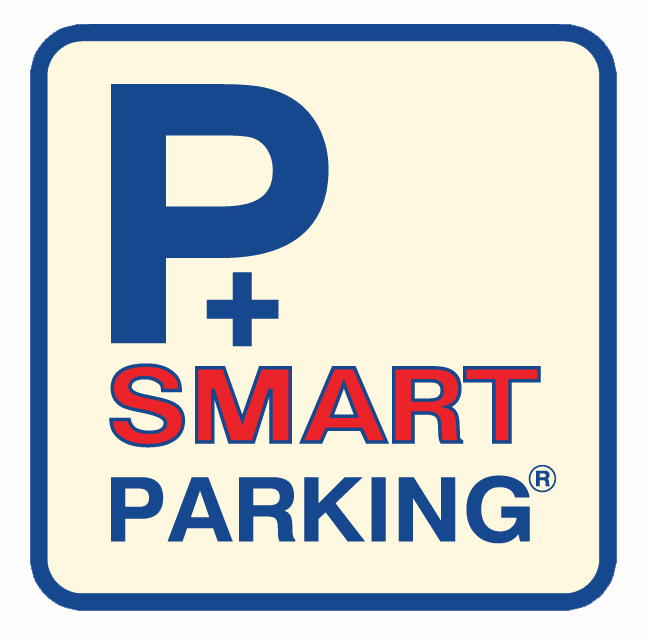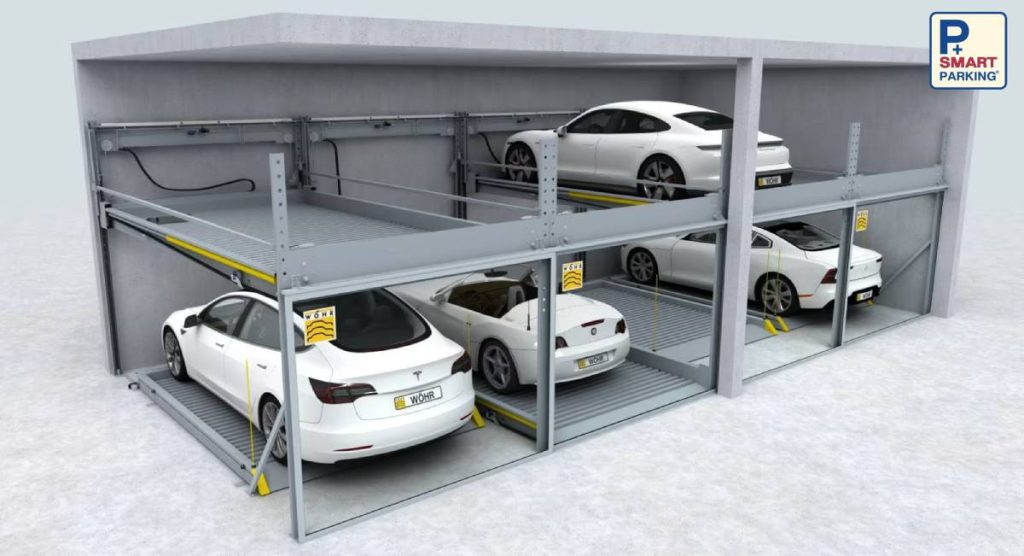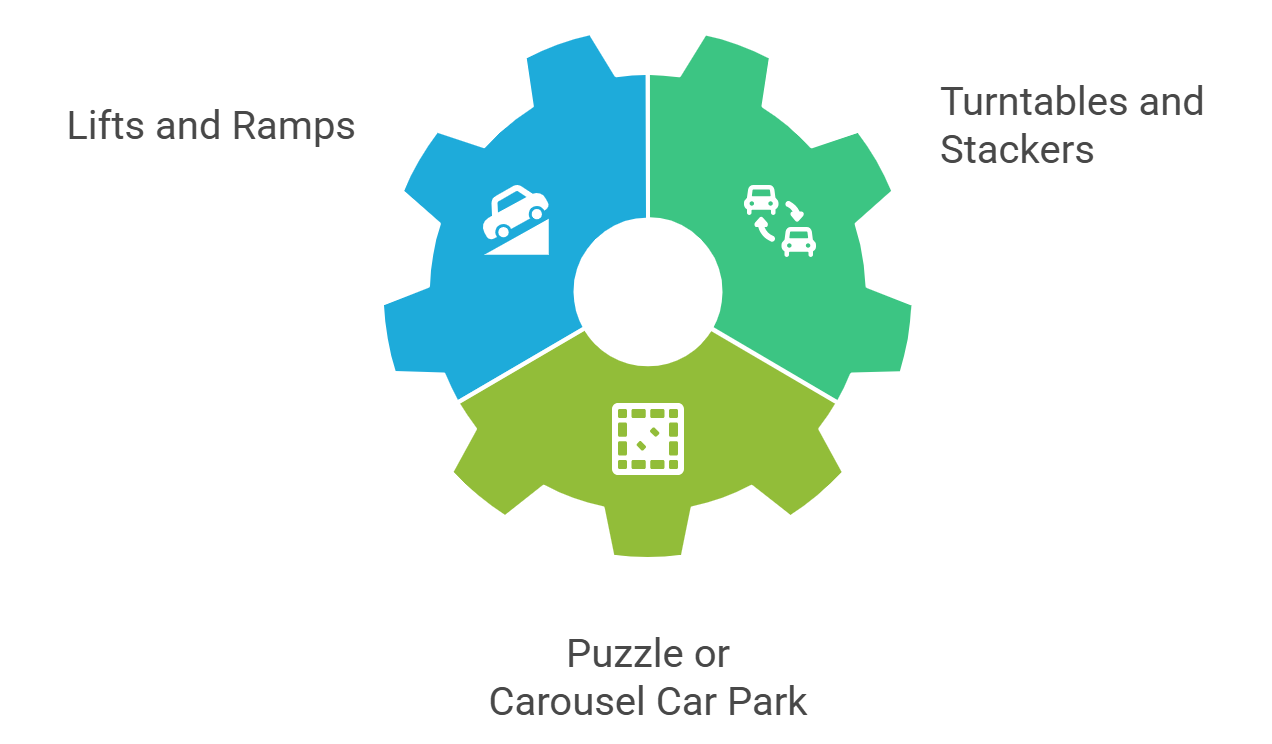Where space within the city is limited, advanced parking systems have been the answer to the increasing number of cars. Mechanical parking systems have also been a worthy answer to the issue, providing efficient, space-saving, and technologically advanced means of parking cars. The article gives the applications of mechanical parking, its various potentials and advantages, and discusses its effect on the environment and investment.
The Rotary parking system is one of the key applications of mechanical parking, using vertical or horizontal rotation to maximize capacity in limited spaces. Contact Smart Parking for tailored solutions
Table: Mechanical Parking Applications & Benefits
| Category | Details & Explanation |
|---|---|
| Applications of Mechanical Parking | – City commercial parking garages (city centers, malls, hotels)
– Residential high-rise complexes – Commercial district parking – Transit stations and airports – Special use cases (e.g., valet/self-parking systems) |
| Key Mechanical Systems | – Lifts and ramps (ideal for small to medium buildings)
– Turntables and stackers (vertical or rotational stacking) – Puzzle or carousel parking (rotating grids) – Multi -level computerized parking systems (automated car movement) |
| Benefits of Mechanical Parking | – Space optimization (vertical and compact car stacking)
– Enhanced security (reduced human error, theft, vandalism) – Convenience and faster parking/retrieval – Labor cost savings – Improved urban aesthetics and reduced clutter |
| Environmental Benefits | – Reduced land use and urban sprawl
– Lower vehicle emissions due to less idling – Supports sustainable, transit -friendly urban mobility – Increased energy efficiency in future designs |
| Economic & Investment Advantages | – Increased parking capacity and long
-term revenue – Lower maintenance and operational costs – Increased property values – Faster ROI, especially in automated systems, due to lower labor costs |
| Advanced System Components | – Intelligent control systems for car movement and safety
– Mechanical components like lifts, conveyors, turntables – User interfaces such as ticket/card entry systems |
| Notable Systems | – Tower Parking System: Highly efficient vertical parking solution maximizing space
– Rotary Parking System: Uses rotation to maximize capacity in tight spaces |
Applications of Mechanical Parking
Mechanical parking can be utilized to refer to a row of mechanical machines used to optimize the parking space offered in densely populated areas. They vary from a row of simple lifts to highly advanced multi-level platforms with designated uses and features.
Some of the common applications of mechanical parking involve:
City Commercial Parking Garage:
Where floor space is in short supply, i.e., in city centers, car park systems increase the number of automobiles in one unit from double to triple. They are especially ideal for shopping centers, offices, and hotel complexes.
Residential Complexes:
Mechanical parking is usually installed in residential high-rise residential complexes in order to allow the residents to have a convenient and secure parking facility without occupying resident space worth its value.
Commercial District Parking Garages:
Commercial downtowns are all equipped with automated big garages, eliminating the congestion and allowing easy car retrieval.
Transit Stations and Airports:
Automatic parking enables faster acceleration of car handling during peak traffic with fast turnaround and optimal use of space.
Special Use:
The systems call for special conditions, i.e., valet parking, where the vehicles are left to park themselves and recovered within a given time interval without any human aid.
Mechanical Parking Benefits
Mechanical car parks have been blessed with a plethora of advantages that have placed them as the highest choice for urban planning and development during contemporary times.
As part of modern smart parking solutions, these systems save space, improve safety, and make parking faster and more efficient for cities and businesses.
1. Space Optimization
The most helpful information is to expand the space for parking to an immense level without expanding the ground. Space is utilized more effectively with mechanical parking because it enables many vehicles to pile above each other or in a cramped space, while ground space can be utilized with any other activity.
2. Improved Security and Safety
Computer systems have fewer human interfaces, and this decreases the risk of accidents, theft, or vandalism. Vehicles are kept safe in closed or half-open systems, giving car owners a sense of security.
3. Convenience and Efficiency
Robotic car park systems usually have minimal human intervention, fast delivery, and friendly interfaces, hence convenient parking and vehicle retrieval by the users.
4. Labor Cost Savings
Automation does not need any personnel or parking attendants, thus the cost of operating is reduced. It is very convenient in skyscrapers.
5. Aesthetic Beauty
Mechanical car stacking parks parking space in a small, little building, thus there is minimal disorganization and the city gets cleaner. It is more effective in land use planning and cleaning the city.
Functionality of Mechanical Parking Systems
Mechanical parking is offered by a broad array of mechanisms, and each of them possesses some degree of functionality which is best applicable to an application.
Lifts and Ramps:
Hydraulic or electric lifts are used for the transportation of cars between floors in these systems. They are helpful but appropriate only for small- and medium-sized buildings.
Turntables and Stackers:
Cars are stacked over one another or turned back to front on turntables in the spirit of space saving.
Puzzle or Carousel Car Park:
Cars are set in a revolving or rotating grid space where more than one car can fit into a confined space and are driven a short distance.
Multi-Level Computerised Parking Systems
Computerised parking systems featuring computers that move cars horizontally and vertically to parking spots with little human intervention.
The main elements used are:
Control Systems: The intellect behind the system, regulating car movement and safeguarding.
Mechanical components: This would include lifting equipment, conveyor sections, turntables, and moveable platforms, mechanically relocating the cars.
User interface: User input and output, typically with ticketed or card-entry.
Environmental Benefit of Mechanical Parking
Apart from efficiency and the employment of full space, mechanical parking boasts massive environmental benefits in favor of green city concepts of development.
The applications of mechanical parking range from residential complexes to busy commercial districts, and the Tower parking system is one of the most efficient solutions.
1. Less Land Use
By clustering and vertical parking, mechanical parking minimizes parking space demand in parking lots, which is also one of the main causes of loss of habitat and urban sprawl.
2. Smaller Carbon Footprint
Computerized systems will have faster return of vehicles as well as lower idling, which lowers emissions generated from driving out of parking bays. Space conservation is also comparable to smaller amounts of building material and utilized energy.
3. Assured Supply of Sustainably Connected Urban Mobility
Mechanical parking encourages the construction of compact, mixed-use downtown central business districts accessed by non-motorized and transit pedestrian and transit travel, and precludes solo-occupant automobile travel.
4. Energy Efficiency
Future mechanical parking systems will be designed with energy-efficient controls and drives that reduce electricity consumption.
5. Environmental Benefit of Mechanical Parking
|
Benefit |
Impact |
|
Lower land footprint |
Constrains urban sprawl, retains green areas |
|
Reduced emissions from vehicles while parking |
Minimizes idling and negotiating within parking facilities |
|
Enabling more dense urban development |
Enables pedestrian-friendly, transit-rich communities |
|
Efficient use of energy |
Lowers total energy consumption |
Effect on Mechanical Parking Investment
This investment in mechanical parking plans can be long-term, societal, and budget-strategic.
Short-Term Investment vs. Long-Term Returns
Although more initial capital outlays to install mechanical parking systems are incurred in relation to traditional car parks, long-term benefits tend to outweigh the expense. These include:
– Increased future revenues through added capacity
– Lower upkeep costs
– Property value increases with an infrastructural improvement.
– The city looks better as well as more efficient
Return on Investment (ROI)
ROI for mechanized parking depends on system size, technology utilized, local demand conditions, and operating efficiency. The robot systems realize their ROI earlier as there is no maintenance and labor cost.
Why Mechanical Parking Matters
Finally, the use of mechanical parking is universal and applicable to all the requirements and industries in the city. Its benefits—space saving, safety, convenience, and sustainability—are natural concepts of city planning these days. For seeking sustainability and optimal use of land, cities will certainly prioritize mechanical parking systems in urban transport planning in the future.



